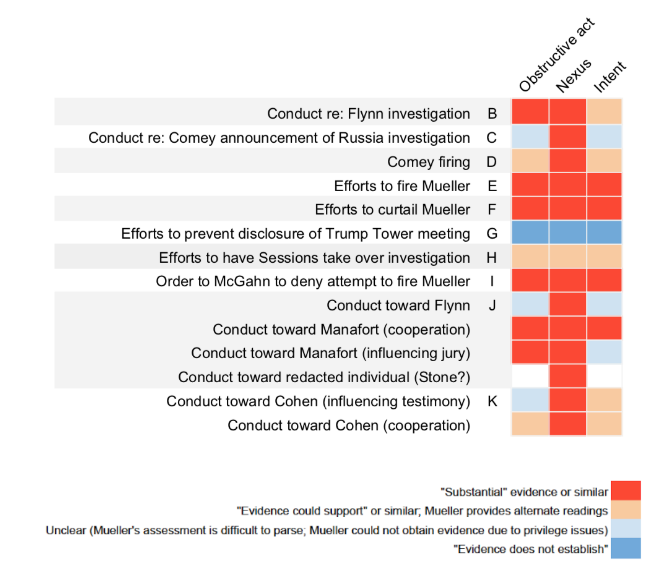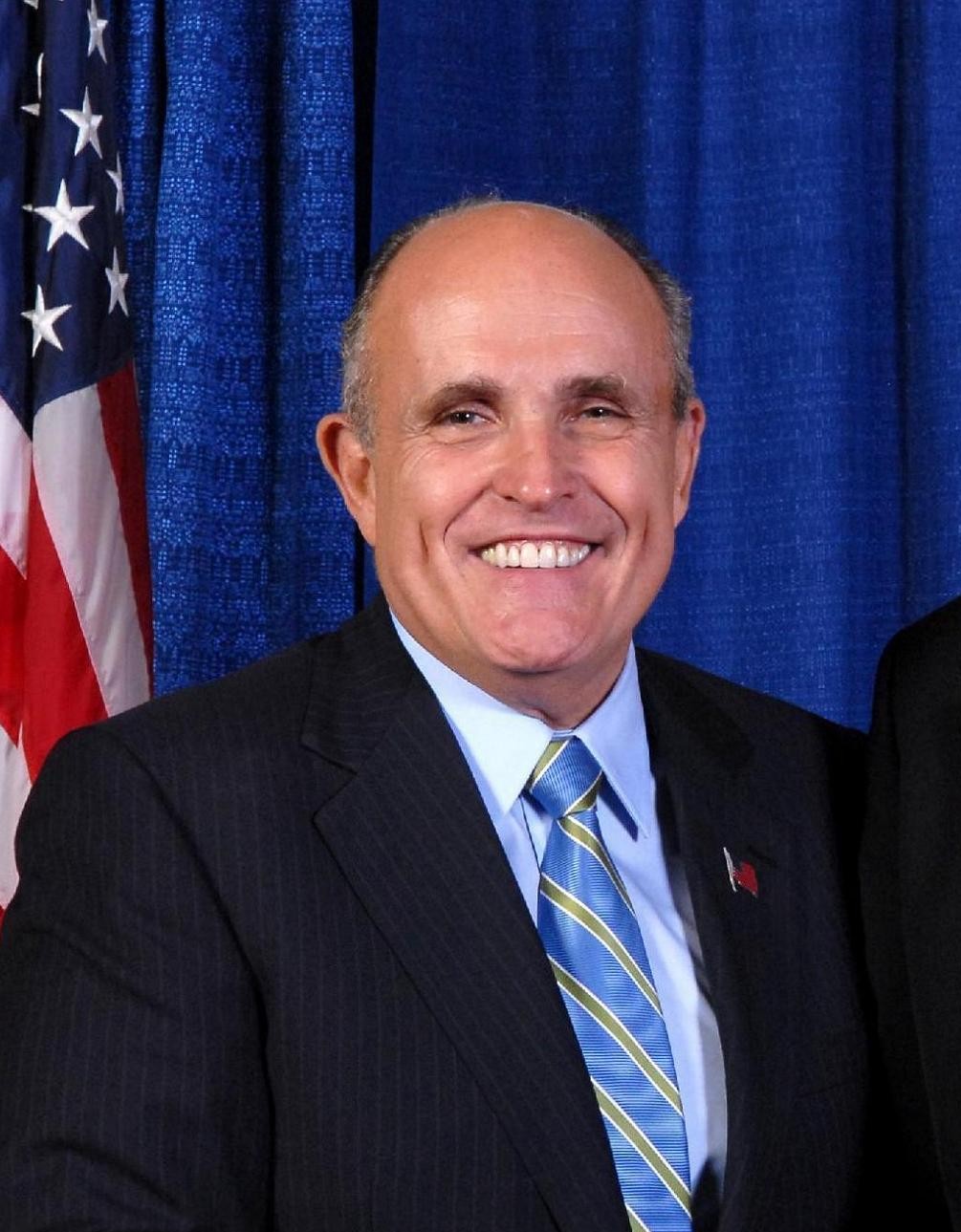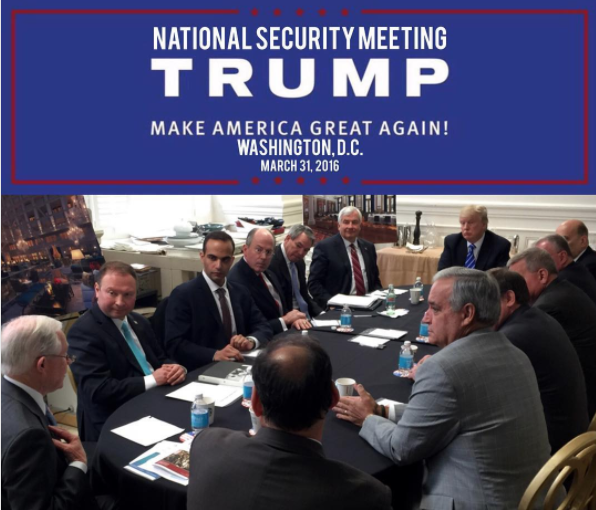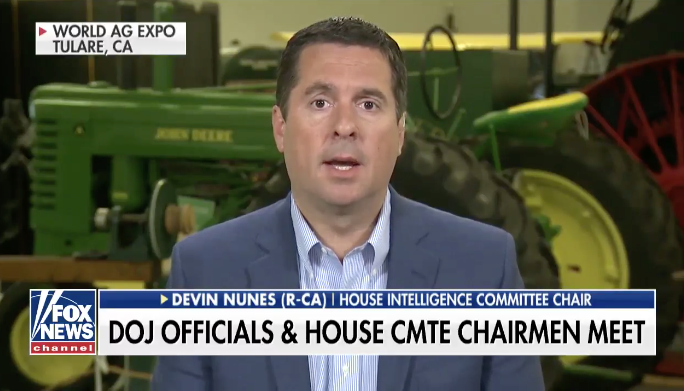I’ve got a bunch more posts on the Mueller Report I’m going to eventually write; I’ve still got a slew of theories and observations to share. But there’s one topic I just have guesses on, one I’d love to have more people weigh in on.
Why did Mueller’s team include Donald Trump’s statement on the June 9 meeting — which is described not as a false statement, but an effort to prevent the disclosure of Don Jr’s emails setting up the meeting — in his obstruction analysis?
The obstruction analysis on the June 9 meeting shows it’s not itself obstruction
As a number of reviews of the Mueller Report obstruction analysis show, the June 9 meeting cover-up is the one obstructive act where the report concludes the evidence did not establish it as an act of obstruction for all three factors:

As the obstruction analysis lays out, Trump talked hopefully about ensuring the emails didn’t get out, but there’s no evidence he took action, beyond lying publicly, to suppress them.
Each of these efforts by the President involved his communications team and was directed at the press. They would amount to obstructive acts only if the President, by taking these actions, sought to withhold information from or mislead congressional investigators or the Special Counsel. On May 17, 2017, the President’s campaign received a document request from SSCI that clearly covered the June 9 meeting and underlying emails, and those documents also plainly would have been relevant to the Special Counsel’s investigation.
But the evidence does not establish that the President took steps to prevent the emails or other information about the June 9 meeting from being provided to Congress or the Special Counsel. The series of discussions in which the President sought to limit access to the emails and prevent their public release occurred in the context of developing a press strategy.
It then repeats that analysis by showing that while withholding the emails might amount to obstruction, he did not withhold emails.
As noted above, the evidence does not establish that the President sought to prevent disclosure of the emails in those official proceedings.
Then, in the intent section, it shows Trump’s central role in crafting the adoptions statement, while again concluding that the statement doesn’t amount to withholding the email.
The evidence establishes the President’s substantial involvement in the communications strategy related to information about his campaign’s connections to Russia and his desire to minimize public disclosures about those connections. The President became aware of the emails no later than June 29, 2017, when he discussed them with Hicks and Kushner, and he could have been aware of them as early as June 2, 2017, when lawyers for the Trump Organization began interviewing witnesses who participated in the June 9 meeting. The President thereafter repeatedly rejected the advice of Hicks and other staffers to publicly release information about the June 9 meeting. The President expressed concern that multiple people had access to the emails and instructed Hicks that only one lawyer should deal with the matter. And the President dictated a statement to be released by Trump Jr. in response to the first press accounts of the June 9 meeting that said the meeting was about adoption.
But as described above, the evidence does not establish that the President intended to prevent the Special Counsel’s Office or Congress from obtaining the emails setting up the June 9 meeting or other information about that meeting.
Curiously, this analysis of intent doesn’t talk about why Trump may have wanted to hide the truth about the June 9 meeting, even though elsewhere the report suggests that, overall, one motive for Trump obstructing the investigation might be because he thought the June 9 meeting would be found to be criminal.
So Mueller spent over eight pages laying out whether Trump’s role in crafting a deceitful statement about the June 9 meeting was obstruction of justice when, according to the report’s analysis of obstruction of justice, it was not even a close call.
So why — in a report that might better be understood as an impeachment referral — did they include that?
Trump’s statement on the June 9 meeting as evidence of corrupt intent for other obstructive acts
I’ve commented elsewhere that one of the posts I’ll eventually do is a narratological analysis of the report. I said that, in part, for the way the report intersperses several acts of potential Trump obstruction that all happened during the same time period in summer 2017. While the report only mentions this in passing, Trump’s lies about the June 9 meeting occur during the same time frame as three other potential obstructive acts that the report shows do amount to obstruction: the effort to get Don McGahn to get Rod Rosenstein to fire Mueller, the request that Corey Lewandowski (!!) fire Jeff Sessions, and the effort to get Sessions to unrecuse.
And, as noted, the June 9 meeting is one of three things — along with the Trump Tower Moscow deal and Trump’s push to have Roger Stone optimize the release of the stolen emails — that the report posits might be the underlying facts Trump was attempting to hide with his other obstruction (note that the report never focuses on Mike Flynn’s discussion on sanctions, which I’ll return to in a later post).
Which suggests Trump’s involvement in the June 9 statement is there not for those actions themselves, but for the way his actions prove corrupt intent for other obstructive actions.
A story describing Trump’s unique actions that nevertheless leaves out the biggest detail
Still, the specific story the report tells is damning. It includes details that suggest this was a unique event, with Trump trying to retain plausible deniability even though several witnesses say he knew about the meeting, and describing Trump preferring to break his cardinal sin, remaining silent on a story. But note that the story leaves out one of the most important details: Vladimir Putin’s interactions with the President during the day Trump wrote his deceitful statement.
Here’s the story, as told in the obstruction section.
Trump claims he didn’t know about the meeting ahead of time, contrary to what several witnesses said.
According to written answers submitted by the President in response to questions from this Office, the President had no recollection of learning of the meeting or the emails setting it up at the time the meeting occurred or at any other time before the election 668
The Chief of Staff learns about the meeting from Sean Hannity, which is just crazy train.
[Reince] Priebus recalled learning about the June 9 meeting from Fox News host Sean Hannity in late June 2017.672
Trump tells Jared not to share details of the meeting with him, according to Hope Hicks.
According to Hicks, Kushner said that he wanted to fill the President in on something that had been discovered in the documents he was to provide to the congressional committees involving a meeting with him, Manafort, and Trump Jr.678 Kushner brought a folder of documents to the meeting and tried to show them to the President, but the President stopped Kushner and said he did not want to know about it, shutting the conversation down.’
[snip]
On June 28, 2017, Hicks viewed the emails at Kushner’s attorney’s office 68° She recalled being shocked by the emails because they looked “really bad.”68′ The next day, Hicks spoke privately with the President to mention her concern about the emails, which she understood were soon going to be shared with Congress.682 The President seemed upset because too many people knew about the emails and he told Hicks that just one lawyer should deal with the matter.”‘ The President indicated that he did not think the emails would leak, but said they would leak if everyone had access to them.684
Later that day, Hicks, Kushner, and Ivanka Trump went together to talk to the President.685 Hicks recalled that Kushner told the President the June 9 meeting was not a big deal and was about Russian adoption, but that emails existed setting up the meeting.686 Hicks said she wanted to get in front of the story and have Trump Jr. release the emails as part of an interview with “softball questions.”687 The President said he did not want to know about it and they should not go to the press 688 Hicks warned the President that the emails were “really bad” and the story would be “massive” when it broke, but the President was insistent that he did not want to talk about it and said he did not want details!'” Hicks recalled that the President asked Kushner when his document production was due.699 Kushner responded that it would be a couple of weeks and the President said, “then leave it alone.”‘ Hicks also recalled that the President said Kushner’s attorney should give the emails to whomever he needed to give them to, but the President did not think they would be leaked to the press.692 Raffel later heard from Hicks that the President had directed the group not to be proactive in disclosing the emails because the President believed they would not leak.693
But Jared claims that didn’t happen. This narrative is largely sourced to interviews with Hope Hicks. Even in his second interview, Jared said it didn’t happen this way.
Hicks 12/7/17 302, at 7; Hicks 3/13/18 302, at I. Counsel for Ivanka Trump provided an attorney proffer that is consistent with Hicks’s account and with the other events involving Ivanka Trump set forth in this section of the report. Kushner said that he did not recall talking to the President at this time about the June 9 meeting or the underlying emails. Kushner 4/11/18 302, at 30.
Hicks is confused about why Trump wants to commit his ultimate sin.
On July 7, 2017, while the President was overseas, Hicks and Raffel learned that the New York Times was working on a story about the June 9 meeting.695 The next day, Hicks told the President about the story and he directed her not to comment.696 Hicks thought the President’s reaction was odd because he usually considered not responding to the press to be the ultimate sin.697 Later that day, Hicks and the President again spoke about the story.698 Hicks recalled that the President asked her what the meeting had been about, and she said that she had been told the meeting was about Russian adoption.699 The President responded, “then just say that.”706
The Report neglects to mention the Putin meeting where he and Trump talked about the subject of the statement.
[see this post]
Trump edits Jr’s statement because it admits they were offered dirt and discussed sanctions relief, defaulting on Putinesque spin.
On the flight home from the G20 on July 8, 2017, Hicks obtained a draft statement about the meeting to be released by Trump Jr. and brought it to the President.701 The draft statement began with a reference to the information that was offered by the Russians in setting up the meeting: “I was asked to have a meeting by an acquaintance I knew from the 2013 Miss Universe pageant with an individual who I was told might have information helpful to the campaign.”702 Hicks again wanted to disclose the entire story, but the President directed that the statement not be issued because it said too much.703 The President told Hicks to say only that Trump Jr. took a brief meeting and it was about Russian adoption.704 After speaking with the President, Hicks texted Trump Jr. a revised statement on the June 9 meeting that read:
It was a short meeting. I asked Jared and Paul to stop by. We discussed a program about the adoption of Russian children that was active and popular with American families years ago and was since ended by the Russian government, but it was not a campaign issue at that time and there was no follow up. 705
Hicks’s text concluded, “Are you ok with this? Attributed to you.”706 Trump Jr. responded by text message that he wanted to add the word “primarily” before “discussed” so that the statement would read, “We primarily discussed a program about the adoption of Russian children.”707 Trump Jr. texted that he wanted the change because “[t]hey started with some Hillary thing which was bs and some other nonsense which we shot down fast. “708 Hicks texted back, “I think that’s right too but boss man worried it invites a lot of questions[.) [U]ltimately [d]efer to you and [your attorney] on that word Be I know it’s important and I think the mention of a campaign issue adds something to it in case we have to go further.” 709 Trump Jr. responded, “lfl don’t have it in there it appears as though I’m lying later when they inevitably leak something.” 710
Hope Hicks channels the President hoping the damning emails would never leak.
Corallo told the President the statement had been authorized and further observed that Trump Jr. ‘s statement was inaccurate and that a document existed that would contradict it.722 Corallo said that he purposely used the term “document” to refer to the emails setting up the June 9 meeting because he did not know what the President knew about the emails.723 Corallo recalled that when he referred to the “document” on the call with the President, Hicks responded that only a few people had access to it and said “it will never get out.”724 Corallo took contemporaneous notes of the call that say: “Also mention existence of doc. Hope says ‘ only a few people have it. It will never get out.”‘725 Hicks later told investigators that she had no memory of making that comment and had always believed the emails would eventually be leaked, but she might have been channeling the President on the phone call because it was clear to her throughout her conversations with the President that he did not think the emaiis would leak.726
Trump’s flunkies deny that the guy who met Vladimir Putin twice during the drafting of the statement wrote the statement.
Over the next several days, the President’s personal counsel repeatedly and inaccurately denied that the President played any role in drafting Trump Jr. ‘s statement.729 After consulting with the President on the issue, White House Press Secretary Sarah Sanders told the media that the President “certainly didn’t dictate” the statement, but that “he weighed in, offered suggestions like any father would do.”730
The Report again neglects to mention the Putin meeting where he and Trump spoke about the subject of the statement.
On July 19, 2017, the President had his follow-up meeting with Lewandowski and then met with reporters for the New York Times. In addition to criticizing Sessions in his Times interview, the President addressed the June 9, 2016 meeting and said he “didn’t know anything about the meeting” at the time.734 The President added, “As I’ve said-most other people, you know, when they call up and say, ‘By the way, we have information on your opponent,’ I think most politicians – I was just with a lot of people, they said … , ‘Who wouldn’ t have taken a meeting like that?”‘735
[see this post]
Providing the framework for the Putin involvement
As I’ve said, I think it remarkable — though perhaps explicable on constitutional grounds — that the report does not mention Putin’s role in all of this, and Trump’s bizarre behavior at the G20 (where he had Ivanka sit in on a meeting while he worked on the statement) more generally. Trump’s interactions with Putin — and his efforts to keep them secret even from staffers — is the subject of other congressional investigation. Which is why this passage from the beginning of the obstruction section sticks out.
Given those considerations, the facts known to us, and the strong public interest in safeguarding the integrity of the criminal justice system, we conducted a thorough factual investigation in order to preserve the evidence when memories were fresh and documentary materials were available.
As noted, I think Mueller included the June 9 meeting statement not because it, by itself, amounts to obstruction, but because the evidence laid out — plus evidence available publicly or via separate congressional investigation — provides an important motivational explanation for the rest of it. Trump made three separate attempts to gut the Mueller investigation in this period, all at a time he was acting unusually (for him) in his efforts to bury the June 9 meeting.
This is the lie he was telling while using his office to try to stop the investigation. Or rather, this is the lie he and Vladimir Putin were telling.
EMPTYWHEEL’S MUELLER REPORT COVERAGE
Two Exceptions to Trump’s “Do Not Recall” Responses: A Limited Answer on an Assange Pardon and a Non-Answer on Sanctions Relief
The Significance of Trump’s Obstruction of Investigation of His Family’s Campaign Finance Crimes, Plural
How “Collusion” Appears in the Mueller Report
Putin’s Ghost: The Counterintelligence Calculus Not Included in the Obstruction Analysis
Working Twitter Threads on the Mueller Report
The Trump Men and the Grand Jury Redactions
Mueller’s Language about “Collusion,” Coordination, and Conspiracy
The Many Lies and Prevarications of Bill Barr
Giorgi Rtslchiladze’s Honor Has Been Sullied because He Can’t Decide Whether He Knows the Tapes He Suppressed Exist or Not
Why Did Mueller Include the June 9 Meeting Statement in His Obstruction Case?
As I disclosed last July, I provided information to the FBI on issues related to the Mueller investigation, so I’m going to include disclosure statements on Mueller investigation posts from here on out. I will include the disclosure whether or not the stuff I shared with the FBI pertains to the subject of the post.










